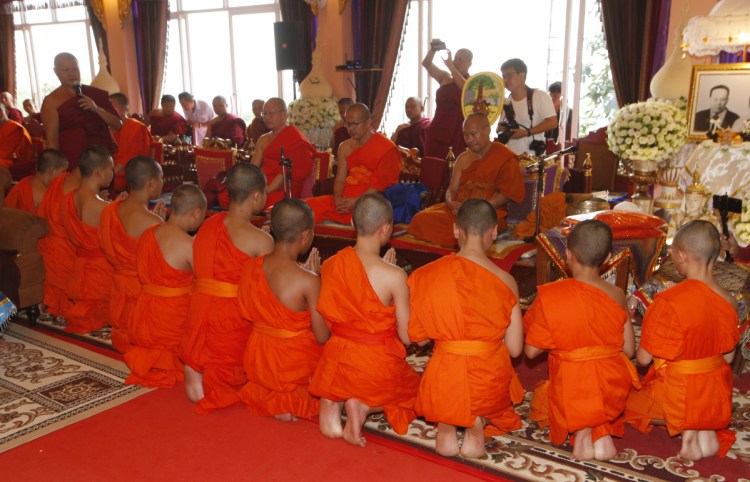MAE SAI, Thailand — With their heads bowed and wearing orange robes, the members of the boys’ soccer team rescued from almost three weeks trapped in a cave in northern Thailand on Saturday completed their time as novice Buddhist monks.
About 300 people gathered for the ceremony on a rainy morning that saw the boys leave temple life to return to their families. Those present gave alms – flowers, food, money – as a gesture of their religious devotion.
The July 25 ordination of 11 boys of the Wild Boars soccer team along with the 25-year-old coach was especially dedicated to a former Thai navy SEAL, Saman Gunan, who died while diving during a volunteer mission to supply the cave with oxygen tanks essential to a successful rescue. A 12th boy did not go through the religious ritual because he isn’t Buddhist.
At the temple near Thailand’s mountainous border with Myanmar, the boys and their coach sat barefooted in a large pavilion in their orange robes. The adults sitting behind them wore white.
With heads bowed, they prayed, fidgeted and occasionally yawned as monks chanted sacred texts. They then placed new monks’ robes on a table in front of a large photo of Saman.
They afterward changed into white shirts and blue pants. Coach Ekapol “Ake” Chanthawong remained in his Buddhist robe, as he has committed to an extended period in the monkhood.
Although they will be giving up their Buddhist robes, it is likely that the boys will retain some of the solitude of temple life, as the government has discouraged for the time being any interviews with them, wielding the threat of legal action under child protection laws.
While there has been some criticism that the government wants to control the narrative of the boys’ ordeal to exploit for political purposes – Thailand’s military rulers are seeking to bolster their popularity ahead of a possible election next year – psychologists agree that the boys may be vulnerable to post-traumatic stress disorder. Both their physical and mental health has been judged fine.
According to Dr. Paul Auerbach at Stanford University’s medical school, it’s possible that they might suffer withdrawal or perhaps post-traumatic stress disorder, which is characterized by symptoms that include insomnia, nightmares, and low mood.
Send questions/comments to the editors.



Success. Please wait for the page to reload. If the page does not reload within 5 seconds, please refresh the page.
Enter your email and password to access comments.
Hi, to comment on stories you must . This profile is in addition to your subscription and website login.
Already have a commenting profile? .
Invalid username/password.
Please check your email to confirm and complete your registration.
Only subscribers are eligible to post comments. Please subscribe or login first for digital access. Here’s why.
Use the form below to reset your password. When you've submitted your account email, we will send an email with a reset code.